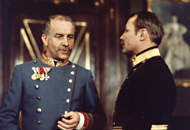The trendy thing to do
What concerned Karl Kraus and other literary critics, when Kraus wrote "The Demolished Literature", was how "coffeehouse literati" was becoming a single mould for Viennese artists and writers, rather than a place to express your own individuality and creativity. What you would expect when many artists gather daily at a cafe might be fruitful exchanges of ideas and knowledge, which are essentially foods for the artists’ creativity. However, this seems not the case in the 19th century Vienna. Kraus feels that "coffeehouse artists" is becoming a style in itself and therefore has lost the creative advancement. For example, Kraus cynically comments that "the ability to become absorbed in the individuality of any guest without sacrificing their own individuality raised these waiters high above all their professional colleagues" (65). In other words, these artists who gather daily in coffeehouses (perhaps already a status quo among the artists to do so) are not making the acquired knowledge their own.
This critique is very similar to Bahr's critique of “new naturalism”. Artists who see themselves as artists simply because they gather at coffeehouses will not dare paint red trees.
What these critics are saying is that art is becoming more of a fashion rather than a passion, a reflection of individuality, or coming from the “nerves”.



5 comments:
I think we are in agreement about why Kraus was upset with the Cofeehouse culture. It seems to me that the coffeehouse "Should" have been a place of inspiration. Artists from all mediums should have been able to mingle and derive new ideas from their contemporaries, but it seems that did not occur. As you point out, the artists became infatuated with the idea of belonging to a group more than concerning themselves with what that group's role is. I especially liked your comment how, "Artists who see themselves as artists simply because... will not dare paint paint red trees."
I happen to believe that Kraus was right and this was a very bad thing for art. Even though, as you said, art cannot be done independent of outside influence, if that influence is nothing more than the incestuous circle we talked about in class, with Bahr leading the parade (looking to the past for HIS inspiration), we're not going anywhere...
Saying "it was fashion and not passion," I think sums up Kraus' argument entirely. That is the perfect way of expressing my opinions of not only Kraus' opinion, but my own about many of the Kaffeehaus Literi of the era. From everything we've read, especially Musil, I've had an image in my head of a few great minds meeting in public places with clinger-ons or "groupies" if you will. I think it is THESE people Kraus criticizes, not the people who legitimately produce intelligent and innvative work.
The comments so far stated, there is a sense of simplicity about two points. That the coffeehouse should of been used for literary development with artisan cohorts but was obviously not used for that. The other point was "fashion rather than passion" which entails art or creating art (the artist) is a glorified job so to speak that someone has to do to survive whether they like it or not. Kraus seemingly deconstructed the "coffeehouse literarti" when he wrote "The Demolished Literature."
Post a Comment